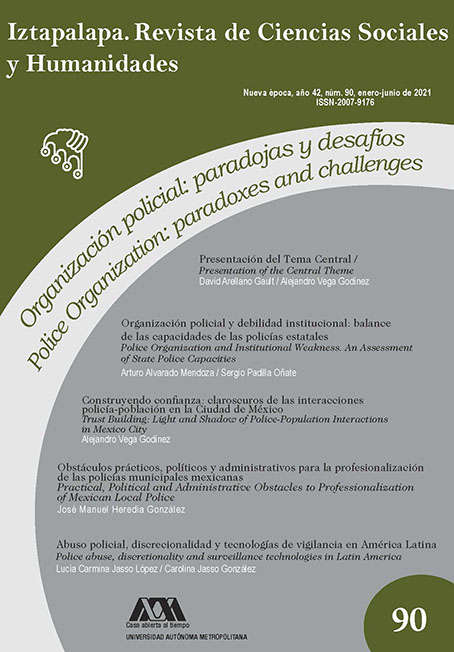Injusticias epistémicas y crisis ambiental
Palabras clave:
Injusticia hermenéutica, injusticia testimonial, narrativas, pensamiento ambiental, ecología queer.Resumen
El presente trabajo tiene como principal objetivo vincular la discusión en torno a las injusticias epistémicas que se ha ido desarrollando al interior de la epistemología social con una serie de problemáticas asociadas con la crisis ambiental contemporánea, en especial con sus aspectos más relacionados con el conocimiento. El término de injusticia epistémica fue originalmente acuñado por la filósofa Miranda Fricker y ha dado lugar a un fecundo campo de estudios que escudriña cómo las diversas posiciones sociales de los individuos que componen una sociedad los colocan en situaciones epistemológicamente asimétricas que puede generar dinámicas injustas como la de ignorar los testimonios de cierto estrato social. Sin embargo, este campo de estudios se ha concentrado excesivamente en las identidades de los individuos y ha dejado de lado dinámicas colectivas y aspectos contextuales como los relacionados con el medioambiente. Justamente la apuesta del presente texto consiste en superar estas limitaciones.Descargas
Citas
Alaimo, Stacy y Susan J. Hekman (eds.) 2008 Material feminisms, Bloomington, Indiana University Press.
Bagemihl, Bruce 1999 Biological exuberance: Animal homosexuality and natural diversity, Nueva York, Macmillan.
Bal, Mieke 2009 Narratology: Introduction to the Theory of Narrative, Toronto, University of Toronto Press.
Brosius, J. Peter. 1997 “Endangered forest, endangered people: environmentalist representations of indigenous knowledge”, Human Ecology, 25(1), pp. 47-69.
Collins, Harry y Robert Evans 2009 Rethinking Expertise, Chicago, University of Chicago Press.
Crenshaw, Kimberlé 1991 “Mapping the margins: Intersectionality, identity politics, and violence against women of color”, Stanford Law review, vol. 43, pp. 1241-1299.
Cruz Parcero, José Antonio 2007 El lenguaje de los derechos: ensayo para una teoría estructural de los derechos, Madrid, Trotta.
Dotson, Kristie 2011 “Tracking epistemic violence, tracking practices of silencing”, Hypatia, 26(2), pp. 236-257.
Fricker, Miranda 2006 “Powerlessness and social interpretation”, Episteme, 3(1-2), pp. 96-108.
Fricker, Miranda 2007 Epistemic injustice: Power and the ethics of knowing, Oxford, Oxford University Press.
Gaard, Greta 1997 “Toward a queer ecofeminism”, Hypatia, 12(1), pp. 114-137.
Guerrero Mc Manus, Siobhan 2018 “El pánico y tus ojos que me sueñan: etnografía afectiva de un tránsito de género”, en Alba Pons y Siobhan Guerrero (coords.), Afecto, cuerpo e identidad: reflexiones encarnadas en la investigación feminista, México, IIJ UNAM, pp. 99-130.
Guerrero Mc Manus, Siobhan y Leah Muñoz Contreras 2018 “Epistemologías transfeministas e identidad de género en la infancia: del esencialismo al sujeto del saber”, Revista Interdisciplinaria de Estudios de Género, El Colegio de México, 4, 14 de mayo, e-168.
Guerrero Mc Manus, Siobhan y Agustín Mercado Reyes 2019 “Mundos en colisión: antropoceno, ecofeminismo y testimonio”, Sociedad y Ambiente, 19, pp. 7-29.
Haenn, Nora, Richard Wilk y Allison Harnish 2016 The environment in Anthropology, Nueva York, New York University Press.
Haraway, Donna 2013a Primate visions: Gender, race, and nature in the world of modern science, Nueva York, Routledge.
Haraway, Donna 2013b Simians, cyborgs, and women: The reinvention of nature, Nueva York, Routledge.
Harman, Graham 2018 Object-oriented ontology: A new theory of everything, Londres, Penguin UK.
Hochman, Adam 2019 “Racialization: A defense of the concept”, Ethnic and racial studies, 42(8), pp. 1245-1262.
Kidd, Ian James, José Medina y Gaile Pohlhaus 2017 The Routledge Handbook of Epistemic Injustice, Nueva York, Routledge.
Kosek, Jake 2006 Understories: The political life of forests in northern New Mexico, Durham, Duke University Press.
Kusch, Martin 2004 Knowledge by agreement: The programme of communitarian epistemology, Londres, Oxford University Press.
Marder, Michael 2014 Phenomena-critique-logos: The Project of Critical Phenomenology, Londres, Rowman & Littlefield International.
Mascia-Lees, E. Frances y Nancy J. Black 2016 Gender and Anthropology, Nueva York, Waveland Press.
Mortimer-Sandilands, Catriona y Bruce Erickson (eds.) 2010 Queer ecologies: Sex, nature, politics, desire, Bloomington, Indiana University Press.
Pohlhaus, Gaile 2017 “Varieties of Epistemic Injustice”, en I. J. Kidd, J. Medina y G. Pohlhaus (eds), The Routledge Handbook of Epistemic Injustice, Nueva York,
Routledge, pp. 13-26. Proctor, Robert y Londa Schiebinger 2008 Agnotology: The making and unmaking of ignorance, Stanford, Stanford University Press.
Richards, Robert J. 1992 “The structure of narrative explanation in history and biology”, History and evolution, Albany, Suny Press, pp. 19-53.
Roth, Paul A. 1989 “How narratives explain”, Social Research, 56(2), verano, pp. 449-478.
Roth, Paul A. 2017 “Essentially narrative explanations”, Studies in History and Philosophy of Science Part A, 62, pp. 42-50.
Roughgarden, Joan 2013 Evolution’s rainbow: Diversity, gender, and sexuality in nature and people, Los Ángeles, University of California Press.
Rouse, Joseph 1994 Engaging science: How to understand its practices philosophically, Nueva York, Cornell University Press.
Shieber, Joseph 2015 Testimony: A philosophical introduction, Nueva York, Routledge.
Thomas, Julia A. 2017 “Historia económica en el Antropoceno: cuatro modelos”, Desacatos, 54, pp. 28-39.
Tsing, Anna 2011 Friction: An ethnography of global connection, Princeton: Princeton University Press.
Wilson, David S. 2005 “Evolutionary social constructivism”, en J. Gottschall y D. S. Wilson (eds.), The Literary Animal: Evolution and the Nature of Narrative (Rethinking Theory), Nueva York, Northwestern University Press, pp. 20-37




.jpg)

.png)
.jpg)




.png)
.png)
1.png)
